Implementing Business Continuity: A Step-by-Step Guide for Classic Fine Foods Malaysia
Chapter 10
Implementing Program Management Phase for BCM Planning Methodology for Classic Fine Foods Malaysia
Introduction
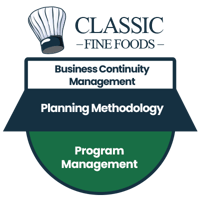 In today’s dynamic business environment, organisations must be prepared to respond to disruptions effectively to ensure continuity of operations.
In today’s dynamic business environment, organisations must be prepared to respond to disruptions effectively to ensure continuity of operations.
 For Classic Fine Foods (CFF) Malaysia, a leading provider of premium products and services, implementing a robust Business Continuity Management (BCM) program is critical to safeguarding its reputation, customer trust, and operational resilience.
For Classic Fine Foods (CFF) Malaysia, a leading provider of premium products and services, implementing a robust Business Continuity Management (BCM) program is critical to safeguarding its reputation, customer trust, and operational resilience.
This chapter focuses on the Program Management Phase of the BCM Planning Methodology, aligned with the ISO 22301 standard. This phase is the foundation for building a sustainable and effective BCM framework.
The Program Management Phase is the cornerstone of the BCM lifecycle. It ensures that the organisation establishes a structured approach to managing business continuity.
It involves defining the scope, objectives, and governance structure of the BCM program, securing leadership commitment and allocating resources.
This phase sets the stage for the successful implementation of subsequent BCM activities, including risk assessment, business impact analysis, and strategy development.
Key Objectives of the Program Management Phase
The primary objectives of the Program Management Phase for CFF Malaysia are:
Establishing Governance and Leadership Commitment
- A successful BCM program requires strong leadership support and a clear governance structure.
- This involves appointing a BCM Steering Committee and a dedicated BCM Manager to oversee the program’s implementation and ensure alignment with organisational goals.
Defining the Scope and Objectives
- The scope of the BCM program must be clearly defined to address the critical business functions and processes essential for CFF Malaysia’s operations.
- Objectives should be specific, measurable, achievable, relevant, and time-bound (SMART).
Developing a BCM Policy
- A formal BCM policy provides a high-level framework for the program, outlining the organisation’s commitment to business continuity, roles and responsibilities, and compliance with ISO 22301 requirements.
Allocating Resources and Budget
- Adequate resources, including personnel, technology, and financial support, must be allocated to ensure the successful implementation and maintenance of the BCM program.
Building Awareness and Training
- Employees at all levels must know the importance of business continuity and their roles in the BCM program.
- Training and awareness initiatives should be conducted to foster a culture of resilience.
Steps in the Program Management Phase
Establishing Governance Structure
-
BCM Steering Committee: This committee includes senior management representatives and provides strategic direction and oversight for the BCM program.
-
BCM Manager: A dedicated individual responsible for coordinating BCM activities, ensuring compliance with ISO 22301, and reporting progress to the Steering Committee.
-
Roles and Responsibilities: Clearly define the roles and responsibilities of all stakeholders involved in the BCM program.
Defining Scope and Objectives
-
Identify critical business functions, processes, and locations that fall within the scope of the BCM program.
-
Set SMART objectives aligning with CFF Malaysia’s strategic and operational goals.
Developing the BCM Policy
-
The BCM policy should reflect the organization’s commitment to maintaining business continuity and complying with ISO 22301.
-
Key elements of the policy include:
-
Purpose and scope of the BCM program.
-
Roles and responsibilities.
-
Commitment to continuous improvement.
-
Compliance with legal, regulatory, and contractual requirements.
-
Resource Allocation
-
Secure budget approval for BCM activities, including risk assessments, business impact analysis, and strategy development.
-
Allocate personnel with the necessary skills and expertise to support the BCM program.
-
Invest in technology and tools to facilitate BCM planning and implementation.
Awareness and Training
-
Conduct awareness sessions to educate employees about the importance of business continuity and their roles in the BCM program.
-
Provide specialized training for key personnel involved in BCM activities, such as risk assessment and incident response.
Program Documentation
-
Develop a BCM Program Charter to formalize the program’s objectives, scope, governance structure, and resource requirements.
-
Maintain detailed documentation of all BCM activities, including meeting minutes, policy documents, and training records.
Challenges and Mitigation Strategies
Lack of Leadership Commitment
-
Challenge: Without strong leadership support, the BCM program may lack direction and resources.
-
Mitigation: Engage senior management early in the process and demonstrate the value of BCM in protecting the organization’s reputation and profitability.
Resource Constraints
-
Challenge: Limited budget and personnel can hinder the implementation of the BCM program.
-
Mitigation: Prioritise critical activities and seek incremental funding as the program matures.
Resistance to Change
-
Challenge: Employees may resist adopting new processes and responsibilities related to BCM.
-
Mitigation: Foster a culture of resilience through regular communication, training, and recognition of employee contributions.
Summing Up ...
The Program Management Phase is the foundation of CFF Malaysia’s Business Continuity Management Planning Methodology.
By establishing a clear governance structure, defining the scope and objectives, and securing the necessary resources, the organisation can build a robust BCM program that aligns with ISO 22301 requirements.
This phase ensures compliance with international standards and strengthens CFF Malaysia’s ability to respond to disruptions and maintain operational resilience in an increasingly uncertain business environment.
As the organisation progresses through the BCM lifecycle, the Program Management Phase will serve as a guiding framework, enabling CFF Malaysia to achieve its strategic objectives and safeguard its reputation as a trusted provider of premium food products and services.
This chapter is the second part of the eBook "Driving Business Continuity: Implementing BCM for Classic Fine Foods Malaysia." eBook two is titled "Implementing Business Continuity: A Step-by-Step Guide for Classic Fine Foods Malaysia", which provides a comprehensive guide to implementing a BCM system in alignment with ISO 22301
| Driving Business Continuity: Implementing BCM for Classic Fine Foods Malaysia | |||||
| Implementing Business Continuity: A Step-by-Step Guide for Classic Fine Foods Malaysia | |||||
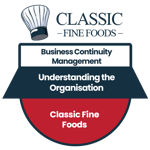 |
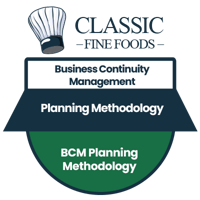 |
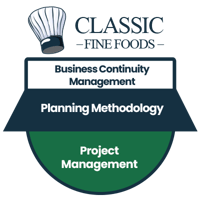 |
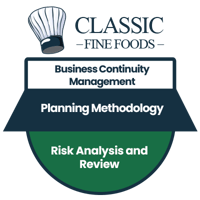 |
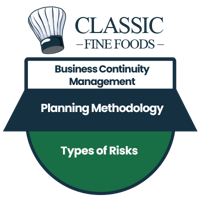 |
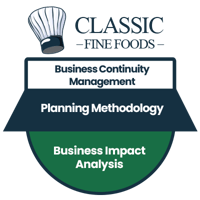 |
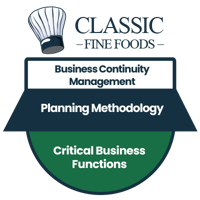 |
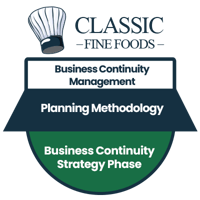 |
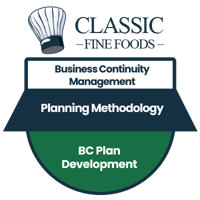 |
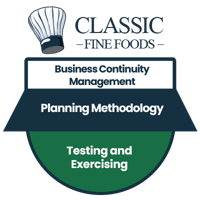 |
 |
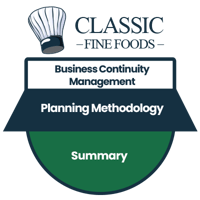 |
More Information About Business Continuity Management Courses
To learn more about the course and schedule, click the buttons below for the BCM-300 Business Continuity Management Implementer [BCM-3] and the BCM-5000 Business Continuity Management Expert Implementer [BCM-5].




![Register [BL-B-3]*](https://blog.bcm-institute.org/hs-fs/hubfs/hub_generated/resized/19a8306f-6b76-45ff-8585-95111f393aeb.png?width=200&height=56&name=19a8306f-6b76-45ff-8585-95111f393aeb.png)



![FAQ [BL-B-3]](https://blog.bcm-institute.org/hs-fs/hubfs/hub_generated/resized/9b7f5669-8ad6-450b-a98f-5f5d49ebfc8e.png?width=150&height=150&name=9b7f5669-8ad6-450b-a98f-5f5d49ebfc8e.png)
![Email to Sales Team [BCM Institute]](https://blog.bcm-institute.org/hs-fs/hubfs/hub_generated/resized/83ae9ad3-affc-416e-8f51-64218d6d98f2.png?width=100&height=100&name=83ae9ad3-affc-416e-8f51-64218d6d98f2.png)





